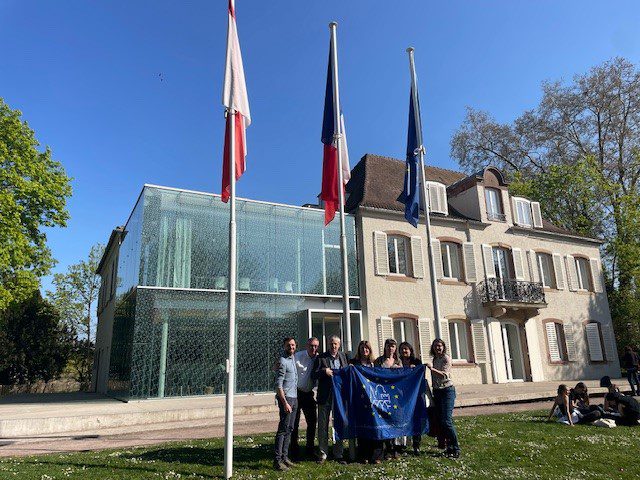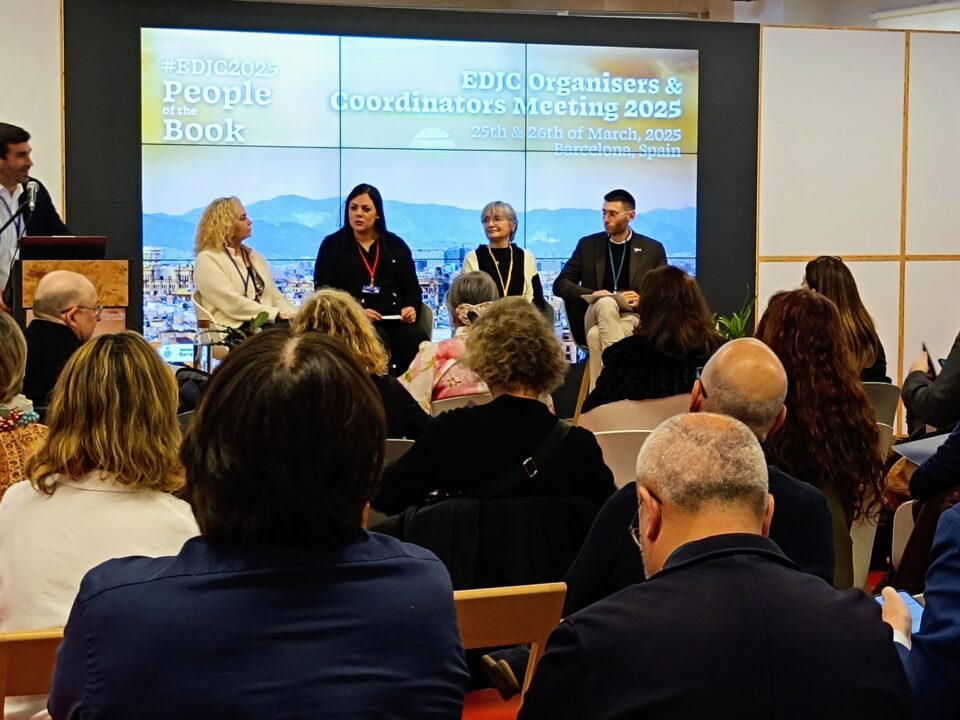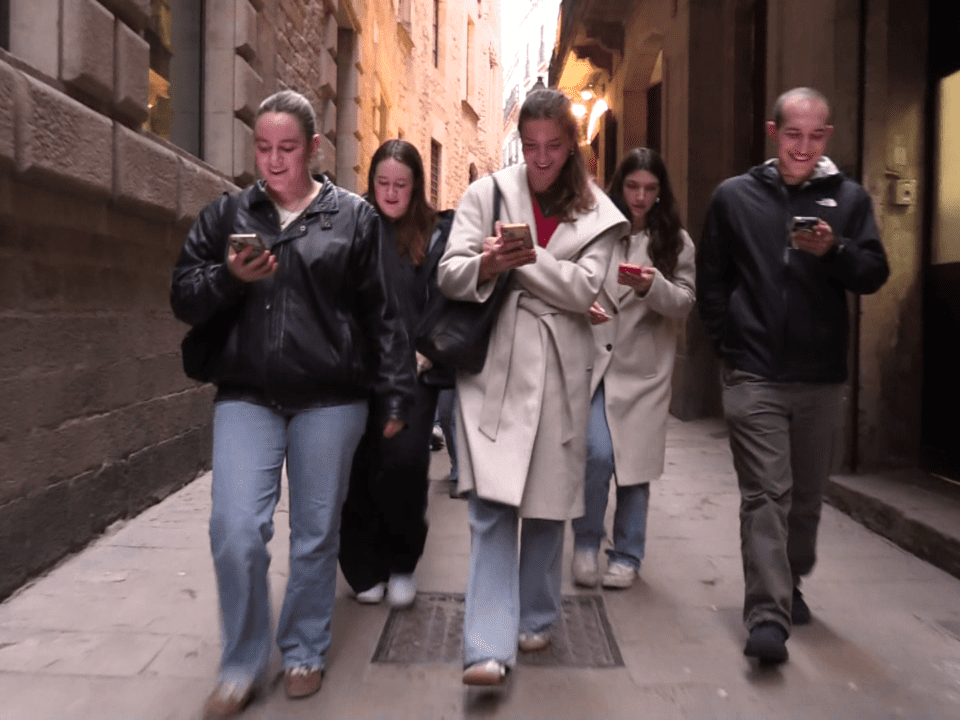- Filter by
- Categories
- Tags
- Authors
- Show all
- All
- AEPJ News
- Andalusia
- Austria
- Azerbaijan
- Balti
- Belarus
- Bendery
- Braunschweig
- Celle
- Chisinau
- EDJC old editions
- EDJC22
- EDJC23
- EDJC24
- EDJC25
- France
- Georgia
- Germany
- Girona
- Hannover
- Hildesheim
- Italy
- Izmir
- Lithuania
- Medieval Route
- Moldova
- National Route
- Orhei
- Padua
- Palaces, Villas and Country Houses
- Poland
- Regional Route
- Rhineland
- Rybnitsa
- Soroca
- Spain
- Thematic Route
- Tiraspol
- Turkey
- Ukraina
- Uncategorized
Young members of the Lech Lecha Jewish community in Minsk recently participated in a unique heritage walk aimed at testing the demo version of a mobile toolkit developed within the Next Routes Project. This initiative is part of a broader effort to make European history and heritage more accessible and engaging through interactive, tech-driven experiences, where AEPJ and The Together Plan joined efforts to later transfer the outputs of the project to the European Routes of Jewish Heritage members.
The tour started at the Daumana Street Synagogue, the only active Orthodox synagogue in Minsk and an important cultural and spiritual centre for the local Jewish community. From there, participants followed a carefully designed route through the city, uncovering the layered and often overlooked history of Jewish life in the Belarusian capital.
AEPJ takes part of the working group of the European Heritage Days for the definition of the theme of 2027, contributing from the Jewish heritage narratives perspective. The meeting is framed within the strategic cooperation between Cultural Routes and the European Heritage Days the Council of Europe.
The AEPJ has been invited by the Council of Europe to the working group on the theme of the 2027 European Heritage Days, which is composed by a core of experts representing several countries, national coordinators of the EHD, and experts in cultural heritage management. In its quest to strengthen transversal relationships between the different projects around cultural heritage that the Council of Europe promotes, the coordination team of the EHD at European level has counted on the AEPJ since it is not only the leading institution of the European Routes of Jewish Heritage as a certified by the Council of Europe, but also because the European Days of Jewish Culture take place at the same time of the year as the European Heritage Days.
On April 2–3, 2025, the city of La Laguna in Tenerife hosted the IV Meeting of Cultural Route Managers of the Council of Europe in Spain. This key annual gathering brought together coordinators and representatives from various Cultural Routes to explore strategies for enhancing visibility, communication, and shared identity within the framework of the Council of Europe programme.
The AEPJ was proudly represented by Assumpció Hosta, Secretary General, who contributed to the exchange of best practices and discussions around the challenges and opportunities in the field of communication for cultural routes. The event was structured around thematic plenary sessions, open discussions and working group proposals, resulting in a document of conclusions that outlines practical recommendations to strengthen communication and the strategic positioning of the programme.
The AEPJ is proud to announce the publication of the NOA Guidelines for Fostering Jewish Life, a key milestone within the NOA project (Networks Overcoming Antisemitism), co-funded by the European Union.
These Guidelines provide a constructive, forward-looking framework for municipalities, institutions, and civil society actors to actively support and promote Jewish life in Europe. Rather than focusing solely on security or the fight against antisemitism, the Guidelines invite stakeholders to embrace Jewish heritage and culture as essential components of a vibrant, diverse, and democratic Europe.
Developed through a participatory process involving surveys in 16 countries and contributions from across the Jewish ecosystem, the Guidelines are both practical and reflective. They offer actionable recommendations in areas such as cultural programming, urban planning, education, civic engagement, interreligious dialogue, and heritage protection—giving cities and stakeholders concrete tools to strengthen the presence and visibility of Jewish life in public space and policy.
The AEPJ recently took part in the mid-term partner meeting of the NOA (Networks Overcoming Antisemitism) project, held in Brussels. This significant gathering brought together the project’s core partners—including CEJI – A Jewish Contribution to an Inclusive Europe, the World Jewish Congress, the European Union of Jewish Students, and the AEPJ—to assess the project’s progress and strategically plan upcoming activities.
Supported by the European Commission’s Citizens, Equality, Rights and Values (CERV) programme, the NOA project is dedicated to developing holistic, cross-sectoral strategies aimed at combating antisemitism and fostering vibrant Jewish life across Europe. With the initiative reaching its halfway mark, partners reviewed key achievements and established next steps.
A central focus of the discussions was the National Report Cards, a crucial component of the project offering country-specific analyses on the state of antisemitism and Jewish communal life, based on comprehensive data collection and stakeholder consultations.
Brussels, 2nd of April, 2025 – The AEPJ was proud to participate in the Civil Society Forum on Combating Antisemitism and Fostering Jewish Life, held by the European Commission. Representing AEPJ were François Moyse, President of the association, and Sonja Viličić, Project Manager of the initiative Cities Embracing Jewish Heritage.
The Forum brought together institutions and civil society actors from across Europe, creating a much-needed space for dialogue, collaboration, and strategy-sharing in response to the growing challenges facing Jewish communities. It also served as an important platform for reinforcing the EU Strategy on combating antisemitism (2021–2030) and highlighting the importance of proactively supporting Jewish life in all its diversity.
During the event, AEPJ representatives presented the association’s ongoing work to promote Jewish heritage as a powerful tool for education, inclusion, and the fight against antisemitism.
The annual European Days of Jewish Culture Organisers & Coordinators Meeting, organized by the European Association for the Preservation and Promotion of Jewish Culture and Heritage (AEPJ), concluded successfully in Barcelona on March 26, 2025, drawing more than 50 enthusiastic participants from across Europe. Over two days of vibrant sessions at the innovative Ca l’Alier venue in Barcelona’s Poblenou district, organizers shared insights, formed new partnerships, and prepared strategies for the upcoming 2025 festival.
The event began with a warm institutional welcome from AEPJ Director Victor Sorenssen and AEPJ General Secretary Assumpció Hosta, along with local representatives, including Sara Belbeida, Commissioner for Citizen Relations and Cultural and Religious Diversity of the Barcelona City Council, and leaders of Barcelona’s Jewish communities, Bryan Blacher (CIB.CAT)
The NextRoutes project continues its way, reaching the moment of testing the use of the gamification platform created specifically within the framework of the project. By means of the smartphone application generated, for now in demo format, the Cultural Routes participating in the project have the possibility of implementing self-guided tours through clue games, with a wide versatility, as it can be used in any space such as heritage sites, museums, urban or rural environments to mention some existing examples. The Gaming Labs, designed to test the demo, started in Barcelona last week, where groups of young people, university students of the history of Judaism in Spain, undertook a co-design process, mediated by a local expert, and then went on the tour, testing the knowledge of their classmates.
The European Association for the Preservation and Promotion of Jewish Culture and Heritage (AEPJ) proudly celebrates the well-deserved recognition of Valerie Bello, long-time National Coordinator of the European Days of Jewish Culture in the UK, who has been awarded the prestigious Heritage Hero Lifetime Award by The Heritage Alliance. The award, presented at the historic Tower of London on March 5, acknowledges over 25 years of dedicated service in promoting Jewish heritage across the UK.
Valerie has played a central role in the European Days of Jewish Culture, a festival coordinated by the AEPJ that unites communities across Europe to celebrate Jewish heritage through exhibitions, guided tours, concerts, and cultural programs. Through her tireless efforts, she has ensured that the UK’s participation in the festival remains vibrant and impactful, bringing together synagogues, Jewish organizations, and cultural institutions to open their doors to the public.









